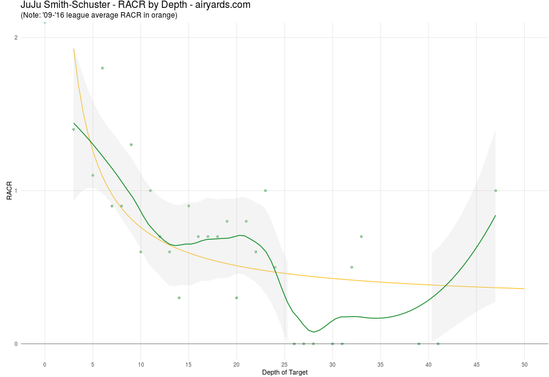There's plenty we don't know about JuJu Smith-Schuster heading into 2019. We don't know if Antonio Brown's departure will impact his slot rate, his low average target depth or his related ability to post strong yards after-the -catch totals after he topped all wide receivers with 587 in 2018. Both his specific volume and his excellent career-to-date efficiency have wide ranges.
But honestly, sometimes the specifics just don't matter. What we do know, and what does matter, is that JuJu Smith-Schuster is really, really good at football.
College production
When we look at young wide receiver's prospect profile, one of the most important factors is age-adjusted production. Several studies have shown athleticism matters less to predicting success at the wide receiver position than production, and age-adjusting that just means the younger a player is able to produce, the better.
JuJu Smith-Schuster is a poster boy for age-adjusted production.
Smith-Schuster has a late-November birthday, but he enrolled early at USC and was playing Division I football before his 18th birthday. He caught 54 passes for 724 yards and five scores that season, very strong numbers for someone of that age.
But Smith-Schuster didn't qualify for a breakout season until the following year, when he caught 89 balls for 1,454 yards and 10 touchdowns. He played 11 of his 14 games that season at 18, and his breakout age from that season is in the 94th percentile of all wide receivers, per Player Profiler.
After Cody Kessler graduated and Sam Darnold took over as a redshirt freshman, JuJu's numbers dipped a bit in his junior year, but he still declared for the NFL draft. That final season, where he still posted 914 yards and 10 scores on 70 catches in 13 games, helped keep him under the radar a bit.
First two seasons
The early declare after early admission to USC meant JuJu was the youngest wide receiver in the 2017 draft. He was just 20, and didn't turn 21 until that November, after he'd posted more that 500 receiving yards and five touchdowns at the NFL level.
One of the main reasons cited to be wary of JuJu in 2019 is increased defensive attention, but that was put to the test late in 2017. First, Martavis Bryant was suspended for the Steelers' Week 8 game, and JuJu was thrust into the starting lineup for the first time since Week 1. He responded with a 7-193-1 line on 10 targets in Detroit on Sunday Night Football.
From there, JuJu was a fixture in the starting lineup, but later that season, in the second quarter of a Week 15 game against New England, Antonio Brown went down with a calf injury. He wouldn't return, and he'd miss both Weeks 16 and 17, before returning for the playoffs.
JuJu responded with lines of 6-6-114 against New England, 7-6-75-1 at Houston, and 10-9-143-1 in a Week 17 win over the winless Browns that featured Landry Jones under center.
You likely have a better recollection of his 2018 season, but in case you've forgotten, he earned 166 targets alongside Antonio Brown, becoming the first Steelers' No. 2 WR to hit even 100 targets since 2013. He caught 111 balls for 1,426 yards, plus seven scores. When the team suspended Brown for Week 17, JuJu saw 10 targets, and while he wasn't quite as efficient in the yardage department, he did find the end zone on one of his five catches for 37 yards.
Over the two seasons, JuJu has played heavily out of the slot, and posted a below average average depth of target for a wide receiver, meaning shorter, higher-percentage passes.
But he's still been able to produce downfield when called upon. The below chart from airyards.com shows his RACR (Receiver Air Conversion Ratio) against the league average at various depths.

JuJu has been promising in the short area of the field where he's seen the majority of his targets, but has been especially good at converting air yards at the intermediate depths up to about 25 yards. His sample of targets at depths beyond that is small, but should he be asked to take on a more prominent role and run more downfield routes, his successes at every stage of his career suggest he can handle it.
The next step
With Antonio Brown now out of the picture, JuJu enters 2019 with more than 2,300 receiving yards and 14 touchdowns to his name, notably still at just 22 years of age. He's still younger than several 2019 rookies like Hakeem Butler and Deebo Samuel, neither of whom posted college numbers over the past two seasons that can compete with what JuJu has already done at the NFL level.
There's little in JuJu's profile that suggests we should be concerned about his ability to rise to the challenge of being the No. 1 in Pittsburgh. In fact, his profile pretty clearly screams he has overall WR1 in his future range of outcomes.
Given the way Brown's departure elevates his target ceiling after he already saw 166 passes in 2018, it's not hard to envision JuJu reaching that lofty status in 2019.























